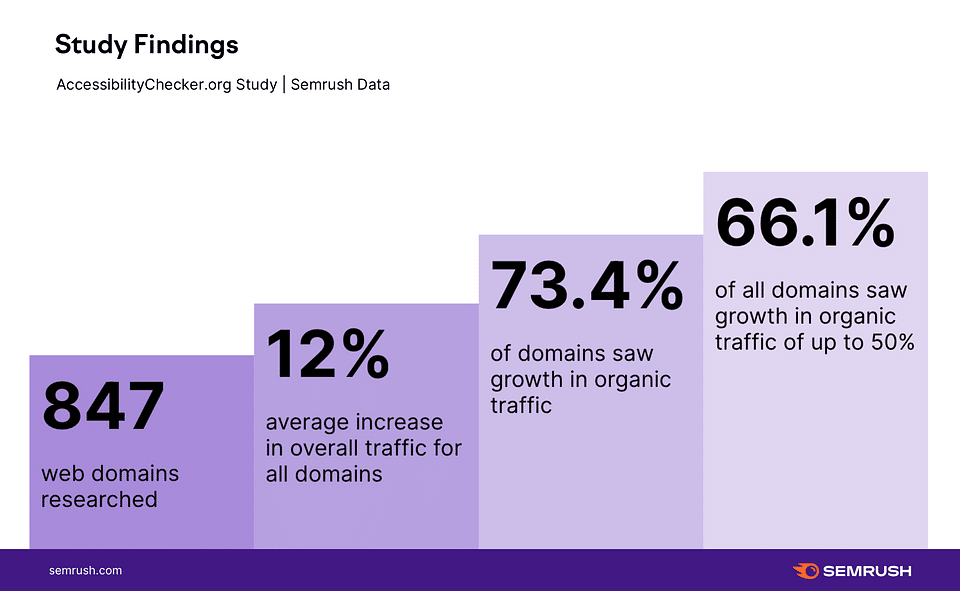A Practical Way to Enhance DEI:
Support Web Accessibility and ADA Compliance Standards
Why is Web Accessibility Important to Large Corporations?
Over 17% of the US Population — nearly 60 million consumers — have a disability that creates a barrier to Internet use, according to Gartner1. That number will increase to 20% by 2030 due to demographic changes.
The Addressable Market Opportunity
60,000,000
1. Sources: Gartner Guide for Digital Accessibility, published February 15, 2023 (revised May 31, 2023); CDC, National Center on Birth Defects and Developmental Disabilities, published May 15, 2023.
What Types of Disabilities?
Motor Skills
Paraplegia, Upper Limb Amputee, Parkinson's, Fine Motor Skills Disability, Dyspraxia
The Addressable Market Opportunity
60,000,000
1. Sources: Gartner Guide for Digital Accessibility, published February 15, 2023 (revised May 31, 2023); CDC, National Center on Birth Defects and Developmental Disabilities, published May 15, 2023.
What Types of Disabilities?
Motor Skills
Paraplegia, Upper Limb Amputee, Parkinson's, Fine Motor Skills Disability, Dyspraxia
The Addressable Market Opportunity
60,000,000
1. Sources: Gartner Guide for Digital Accessibility, published February 15, 2023 (revised May 31, 2023); CDC, National Center on Birth Defects and Developmental Disabilities, published May 15, 2023.
What Types of Disabilities?
Primary Benefits to Commercial Enterprises
Risk Mitigation
Evolving Compliance Landscape: government regulations, international standards, technology advances, emerging legislation

Increased Market Share
Up to 50% more organic search traffic. Gain new customers and improve brand loyalty.

Risk Mitigation
Websites are now covered by The Americans with Disabilities Act (ADA). Digital Accessibility is a requirement, not a choice, as government legislation (national and international) and litigation continues to rise.2
2. Sources: Gartner Guide for Digital Accessibility, published February 15, 2023 (revised May 31, 2023); WhoisAccessible.com.
ADA Lawsuits Continue to Rise
Web Accessibility lawsuits have increased 182% over 5 years, affirmed by the DOJ and the Supreme Court.
Number of Lawsuits Filed
Source: UseableNet 2018 – 2022 Year End Digital Accessibility Lawsuit Reports and 2023 MidYear Digital Accessibility Lawsuit Report.
Industries Targeted in 2022
Source: Accessibility.com 2022 Website Accessibility Lawsuit Recap – Complete Report.
3. Source: UseableNet 2022 Year End Digital Accessibility Lawsuit Report and 2023 MidYear Digital Accessibility Lawsuit Report.
High Profile Lawsuits
The Upshot: Lengthy Litigation and Appeals Typically Result in the Same Remedy: ADA Compliance
Federal law allows fines of up to $75,000 for the first violation and $150,000 for additional ADA violations. States and local governments may allow other penalties. They may require businesses to meet a higher standard of accessibility than the ADA requires. However, to date, the Federal Government has typically not imposed fines. California has another law, the Unruh Civil Rights Act, which provides a statutory penalty of 3x actual damages up to $4,000 per incident. The remedy for most individual or class-action civil lawsuits is for the defendant to bring their website into compliance with the current WCAG standard.
Click on any logo to view more details about related lawsuits.
- National Federation of the Blind
- Class Action
- ADA, CA Unruh Civil Rights Act
- 2006 - 2009
- Damages: $6,000,000
- Site Remediation; 3 years monitoring; train staff
Additional Detail: Hailed as a landmark case for ADA, Target Corporation promised to ensure its website met online accessibility guidelines. NFC agreed to confer to discuss periodic updates and monitor the results of quarterly and annual user accessibility tests. Target.com coding employees attended periodic training to ensure website accessibility. Guest feedback included users of screen-reading technology who tested the site and reported to a compliance individual and the NFB. Monetary damages were paid to the Californian settlement class.
Sources: Northern District Court of California No. 06-1802 MHP, 2007 WL 2846462 October 2, 2007; and Class Action Settlement August 27, 2008
- National Association of the Deaf
- Class Action
- ADA, Section 508
- 2015 - 2020
- Plaintiff's Legal: $1,575,000
- Consent Decree: Captioning to all content; semi-annual reports
Additional Detail: On November 27, 2019, after four years of litigation, both the NAD and Harvard University came to a mutual agreement through a consent decree. The settlement strengthened Harvard’s new digital accessibility policy and was effective as of December 1, 2019. This settlement established set captioning guidelines so that Harvard University can continue to improve accessibility for its online resources for those who are deaf or hard of hearing. This agreement “ensures for the first time that the university will provide high-quality captioning services for online content.”
Sources: New York Times article Feb. 13, 2015, Section A, Page 18 “Harvard and M.I.T. Are Sued Over Lack of Closed Captions” | Consent Decree – US Federal Case 3:15-cv-30023-KAR Document 219 Filed 02/26/20
- Juan Carlos Gil
- Individual Plaintiff
- ADA
- 2017 - 2021
- Plaintiff's Legal Fees, $250,000 set aside; site remediation
- Requires 3rd-party content on site meet ADA standards
Additional Detail: This case was appealed to the 11th Circuit, which ruled on several important foundational legal issues, namely: Winn Dixie is responsible for all accessibility issues of all third-party vendors that choose to operate within its website. This implies that the grocer is legally responsible for obliging any participating third-party vendor on the website to be fully accessible to disabled users. The case also deals with the concept that a business website is a place of public accommodation.
Sources: Best Website Accessibility article published May 4, 2021 “Winn-Dixie: ADA Lawsuit Reverses after 30 Months of Deliberation.”
- Guillermo Robles
- Individual Plaintiff
- ADA
- 2016 - 2022
- Damages: $4,000 plus Legal Fees; Site Remediation
- Appealed to the 9th Circuit and the Supreme Court
Additional Detail: The case was initially dismissed. The 9th Circuit overturned it. Domino’s appealed to the Supreme Court, and the Supreme Court reaffirmed the 9th Circuit’s decision. The total cash damages were only $4,000. But Domino’s suffered damage to its brand. In the opinion of the 9th Circuit: “Robles does not seek to impose liability based on Domino’s failure to comply […]. Rather, Robles merely argues — and we agree — that the district court can order compliance with WCAG 2.0 as an equitable remedy if […] the website […] fails to satisfy the ADA.”
Sources: United States District Court Central District of California Case No. CV 16-6599 Guillermo Robles v. Domino’s Pizza LLC | Article by Seyfarth Shaw LLP, June 28, 2021 in JDSupra.com.
- Elizabeth Aldworth
- Class Action
- ADA
- 2018
- Damages: Plaintiff's Legal Fees, punitive damages
- Site Remediation
Additional Detail: TD Ameritrade agreed to remediate their website, pay Aldworth’s court costs, legal fees, and punitive damages. The discount brokerage firm will “ensure that all feasible components of its website are rendered accessible by certain deadlines, with key features being prioritized,” and will pay attorneys’, court and expert witness fees to Elizabeth Aldworth, the New York State resident who filed the class-action lawsuit in February, according to a letter that lawyers for both parties sent on Tuesday to a U.S. District Court judge in Albany.
Sources: Article published in AdvisorHub by Jed Horowitz, Oct. 4, 2018 “TD Ameritrade to Settle Blind Woman’s Website Accessibility Lawsuit”
- National Association of the Deaf
- Class Action
- ADA
- 2010 - 2012
- Damages: $755,000, court costs
- Platform Remediation; 6 months monitoring schedule
Additional Detail: In one of the first ADA website compliance lawsuits that established that accessibility should include online properties just as physical businesses, the National Association for the Deaf (NAD) filed a lawsuit against the online television and movie streaming giant Netflix in Massachusetts in 2012. This changed the way Netflix operates ever since. NAD and Netflix reached a settlement agreement that would have Netflix provide closed captions to all of their online streaming content within a two-year period.
Sources: Press Release by the National Association of the Deaf (NAD), published October 9, 2010, “Netflix and the National Association of the Deaf Reach Historic Agreement. . .”
- United States DOJ
- Class Action
- ADA
- 2021
- Settlement Agreement
- Site Remediation; 3 years monitoring schedule
Additional Detail: In 2021 and 2022, the DOJ entered into five agreements allowing people with disabilities to access COVID-19 vaccination websites, including pharmacies (CVS and Rite Aid) and grocery chains with pharmacies (Kroger, Meijer, and HyVee). Because of these agreements, the pharmacies updated their websites so they’re easier for people with disabilities to use and to schedule COVID vaccination appointments. The agreement is managed by the Civil Rights Division.
Source: U.S. Department of Justice, Office of Public Affairs – Press Release Nov. 1, 2021, entitled “Justice Department Secures Agreement with Rite Aid Corporation. . .”
- United States DOJ
- Class Action
- ADA
- 2022
- $250,000 to Settlement Fund
- Site Remediation per WCAG 2.1 Standards
Additional Detail: The US Justice Department secured an agreement with CVS Pharmacy requiring it to make web content about the COVID-19 vaccine, including the forms for scheduling an appointment to get the vaccine, conform to the Web Content Accessibility Guidelines (WCAG), Version 2.1, Level AA. CVS must regularly test the pages of its website that include vaccine scheduling and information about the COVID-19 vaccine and quickly fix problems affecting people with disabilities.
Source: U.S. Department of Justice, Office of Public Affairs – Press Release April 11, 2022, entitled “Justice Department Secures Agreement with CVS Pharmacy Inc . . . ”
- National Federation of the Blind
- Class Action
- ADA
- 2013 - 2014
- $100,000; Site Remediation
- Consent Decree: employee training; annual monitoring
Additional Detail: This case represents the first instance where the Department of Justice (DOJ) intervened in an ADA case ending in a 5-year Consent Decree for H&R Block’s website, and mobile apps must be ADA-compliant. H&R Block to adopt a web accessibility policy; initiate training on accessible design for web content personnel; evaluate employee and contractor performance based on ADA; conduct regular testing; and hire an outside consultant to prepare annual independent evaluations of online accessibility.
Source: U.S. Department of Justice, Office of Public Affairs – Press Release March 6, 2014, entitled “Justice Department Enters Consent Decree with National Tax Preparer H&R Block . . .”
Additional Detail: Plaintiff argues that Amazon’s inaccessible website prevents him from accessing not only Amazon’s website but Whole Foods stores (acquired by Amazon). Plaintiff cannot research the store’s products and opening hours on the company’s website and cannot access Amazon’s services, such as the ability to return Amazon products to his local Whole Foods location and other retailers contracted with Amazon. The case was settled.
Sources: PACER US Court Filing System: Cedric Bishop v. Amazon.com Inc., Case No. 1:18-cv-00973, in the U.S. District Court for the Southern District of New York | Top Class Actions article by Emily Sortor published February 7, 2018.
Key Observations
ADA litigation typically ends in a settlement, which does not usually include significant monetary damages to the plaintiff. The Corporation must pay the Plaintiff’s legal costs in approximately half the cases. However, in all cases, the corporation must remediate its digital properties to conform to current WCAG standards and adhere to a court-ordered monitoring system for several years. The corporation must bear the costs.
Since 2015, the US Department of Justice has been intervening on behalf of Plaintiffs to force a settlement or consent decree.
To avoid protracted and costly litigation and reputational harm to your corporate brand, get ahead of the curve and make your site ADA-compliant. Otherwise, you may be ordered to do so anyway, as a condition of settlement, by court order, or under a Consent Decree.
Market Opportunity
Accessible websites get more visitors, higher user engagement, repeat visitors, and more followers — the result: higher revenue for eCommerce retailers and brand loyalty.

Organic Search Traffic
- A 50% increase in organic traffic for 2/3rds of all websites in the study.
Another fact: 96.4% of the top 1,000,000 websites are not accessible.5


Brand Loyalty
- 71% of people with disabilities will leave a website promptly if they cannot access it. 6
- 66% of e-commerce transactions are abandoned by visually impaired people because of a lack of accessibility. 7
- Consumer companies with inaccessible websites lose $6.8 billion annually to accessible competitors. 7


The Experience of a Blind Consumer


4. Source: Study: Is Web Accessibility Key to Driving Organic Traffic? by SEMRUSH, AccessibilityChecker.org, and BuiltWith, published January 25, 2023.
5. Source: WebAIM.org The WebAIM Million 2023 Report on the accessibility of the top 1,000,000 home pages.
6. Source: MDPI: Special Issue “Social Participation and Human Rights” published July 1, 2018 (ISSN 2075-4698).
7. Source: US Department of Commerce (November 16, 2022).
Conclusion
Why are less than 4% of websites accessible?
Manually fixing accessibility issues is expensive and time-consuming. By combining human expertise with technological solutions, enterprises can deliver accessible digital content at scale.
Automation allows for real-time monitoring and fixing the most common accessibility errors as they happen, significantly improving the experience for people with a wide range of disabilities. Experts can then focus on the remaining complex issues that require human judgment and intervention.
Even websites with accessibility embedded in the development process are likely to have accessibility errors. Typically, developers work in two-week “sprint cycles” and work hard to deliver code on time. Unfortunately, accessibility tools will not detect all accessibility flaws, and developers will not have time to make changes before the code is released. Even as accessibility issues are eventually fixed, more are introduced over time, resulting in a never-ending inaccessible website.
Legacy (non-accessible) websites present a systemic problem that requires a technology solution to fix existing errors at scale and provide ongoing monitoring and remediation to ensure continuous accessibility.
Share This Page

